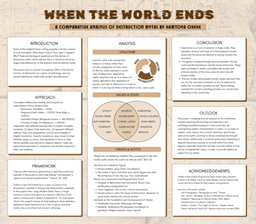What are the more immediate expectations that you have for your research? Now that we are nearing the one month mark of the program, please write about your expectations for your research.
I plan to turn my informal annotated bibliography into a report which addresses the shifting research aims throughout my project. This report will attempt to define destruction myths as well as detail their structure, symbolism, and purpose as a literary form using a comparative framework across my four chosen myths. The goal of this project is to use this framework to develop an understanding of human values and fears that prevail across time as understood through comparison. As I have developed my research question and claims, I also hope to expand this project and touch on the historical interpretations of these texts and the shift of cultural beliefs about ‘the end of the world’, a topic I’m currently unable to address due to the time constraint.
Why does your research matter? Explain the significance of the question you are investigating, and why you are interested in it.
Explaining the importance of ancient literature in a time when people don’t particularly seem to care so much for history or literature to begin with is a bit difficult, and is a question I have struggled with for the past couple weeks as well. I was drawn to the genre of apocalypse and myth separately. A science-fiction project led me down a rabbit hole on solipsism, transhumanism, and immortality, while the motifs of creation in Genesis and other works I read in Literature Humanities led me to comparative mythology. I chose to focus on destruction myths because I thought it was interesting how much emphasis was placed on creation myths over their antithesis, which should have just as much importance, if not more. I am of the opinion that literature is important because it has historical and cultural impacts, not just within the academic sphere. Myth is doubly important because it puts words to the intangible, and gives us a way to comprehend concepts that can’t always be explained. This plays out in narrative archetypes such as good vs evil, the chosen one, and return to a Golden Age —which are used to frame media, politics, religion, and self-understanding.


Please sign in
If you are a registered user on Laidlaw Scholars Network, please sign in
Very interesting! I definitely agree with you about the power of mythology -- there is only so much that explicitly written words can capture. This is an idea which has reared its head in my project too: irony, just like mythology, often operates in a realm that goes beyond literal semantic meaning; one of images, feelings, and brush-stroke connections. I also love what you said at the end about narrative archetypes -- the specific ones that you mentioned are definitely relevant to our current political climate (although I think they're also relevant to nearly any political climate in history).
Hey Kamtoya! I think your research is really fascinating --- I had never really thought about destruction myths, and especially had not considered the fact that they are talked about much less that their opposite: creation myths. From a sociology perspective, I do wonder what our emphasis on creation myths and relative disinterest in destruction myths comes from and what it says about human nature. Thanks for sharing!
Hi Kamtoya! It’s really interesting what you were saying about how creation myths heavily overshadow destruction myths. For me, this is reminiscent of the denial of destruction we have in our society from climate change to global armed conflict. I’m curious how the retelling of myth reflects and shapes our denial of real destruction.
At the same time, I’m curious how these destruction myths shape and alter the connotations of destruction in our society and cross-culturally. While destruction in current events is horrible, there may be other types of destruction that are actually regenerative. Where I’m from in Oregon, there are really bad wildfires that sometimes even spread to residential areas and towns. Part of the reason the issue is so severe is because for a long time firefighters tried to put out every fire that arose. After some of the worst fires which displaced a lot of people, the towns started finally listening to Indigenous community leaders in the region who advocated for small controlled burns which wipe out dead vegetation undergrowth. These small fires before peak fire season limit the amount of available vegetation to burn in a real wildfire and limit its spread. This practice has been conducted in Native American communities for generations. All of this to say that the Western/European view of destruction as only bad can actually lead to a lot of issues, and I’m really curious about how different cultures view destruction in their myths.
I really appreciate your focus on the importance of studying ancient literature even in the modern day. Though my research focuses on the rapidly evolving field of AI, I find myself gravitating nonetheless to more abstract fields in history, literature, and culture such as yours because I am drawn to their contemplative, abstract, and introspective nature that requires deep analysis to uncover their pertinence to the modern day -- but when that pertinence is located, its inherent power becomes so obvious. I am so curious to learn more about the root of your interest in this topic and how you see it as still relevant (which it definitely is) to issues we see culturally in the modern day.